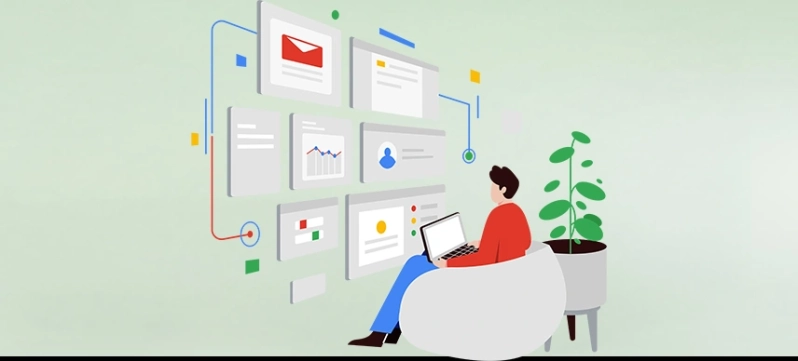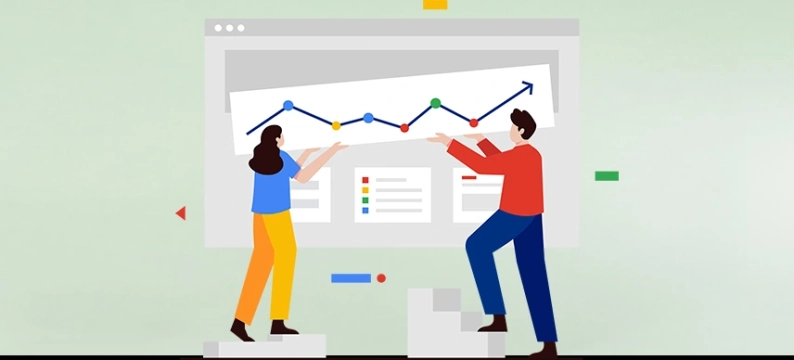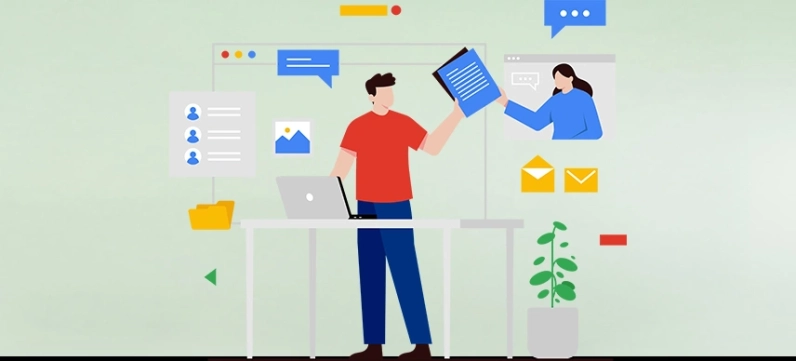
B2B programs help businesses gain a competitive advantage by offering comprehensive tools that streamline business processes and save time and costs.
In this article, we will discuss in detail the ways to establish a strong e-commerce system using B2B programs, the advantages offered by software such as Trizbi ERP, and sectoral applications. We will also touch on frequently asked questions and provide you with more information on this subject.
Fundamentals and Importance of B2B E-Commerce
B2B e-commerce is a trading model in which businesses offer products and services to other businesses via digital platforms. With the digitalization of traditional business processes, businesses can now develop faster, more efficient and lower-cost trading methods.
The prominent benefits of B2B e-commerce are:
- Efficiency: Reduces manual errors by automating ordering processes.
- Cost Savings: Provides a more profitable structure by reducing operational costs.
- Global Market Access: Provides access to a worldwide customer and supplier network.
However, to fully benefit from these benefits, it is essential to use the right tools and strategies.
What are B2B Programs?

B2B programs are software solutions developed for businesses to manage their commercial relationships with other businesses in a digital environment. They optimize many business processes, from order management to inventory tracking, from customer relationship management to analytical reporting. Using the right B2B programs increases the efficiency of businesses and maximizes customer satisfaction.
The main purpose of B2B programs is to enable the digitalization of traditional trade and make business processes faster, more streamlined and transparent. The programs mentioned are generally divided into the following categories:
- ERP Software (Enterprise Resource Planning): Software used to manage business processes in an integrated manner.
- CRM (Customer Relationship Management): Tools that optimize customer relationships and sales processes.
- E-Commerce Platforms: Infrastructures that enable businesses to showcase their products and services online.
- Logistics Management Systems: Solutions that accelerate delivery processes and ensure traceability.
Under this heading, we will discuss in detail how B2B programs add value to business processes, focusing specifically on ERP software.
ERP Software: The Backbone of Business Processes
ERP (Enterprise Resource Planning) software is one of the leading B2B tools that allow businesses to manage all their resources and processes on a central platform. ERP systems facilitate communication and data sharing between different departments. They play a critical role in optimizing business processes and increasing efficiency, especially in B2B commerce.
The basic features of ERP software are:
- Integrated System: ERP software gathers different functions such as finance, accounting, human resources, production, logistics and supply chain under one roof.
- Automation: It reduces error rates and saves time by automating repetitive manual processes.
- Data Management: Enables businesses to effectively process and report large amounts of data.
- Scalability: Can be customized according to the size and needs of businesses.
The Importance of ERP Software in B2B Business Processes

ERP software makes the daily operations of B2B businesses more efficient while also strengthening customer and supplier relationships. Here are the prominent areas of use of ERP software in B2B commerce:
1. Order Management
ERP systems provide powerful tools for tracking customer orders and integrating them into supply chain processes. They create automated processes to ensure orders are received, processed, and delivered accurately.
2. Stock and Inventory Management
Inventory management is of critical importance in B2B commerce. ERP software tracks inventory in real time to:
- Detects product deficiencies in advance.
- Minimizes excess stock situation.
- It facilitates logistics and warehouse management.
3. Supply Chain Management
Managing all stages of the supply chain is vital to the success of B2B businesses. ERP software optimizes supply processes, reducing costs and accelerating processes.
4. Finance and Accounting
B2B programs created with ERP software facilitate financial transactions and ensure that all financial processes are recorded. Features such as automatic invoice creation, payment tracking and budget planning help businesses manage their financial situations transparently.
5. Customer and Supplier Relationship Management
ERP software collects customer and supplier information in a central database. This data can be used to build stronger relationships with both parties and offer personalized solutions.
Advantages of B2B ERP Systems
The main advantages that ERP software adds to B2B business processes are:
- Faster and More Accurate Decision Making: The analysis and reporting tools provided enable businesses to make more informed and faster decisions.
- Operational Efficiency: Processes consolidated on a single platform increase collaboration across departments.
- Cost Savings: Reduces operational costs by reducing manual workload and automating processes.
- Competitive Advantage: The flexibility and scalability provided increases the competitiveness of businesses in the market.
Why is it important to invest in B2B ERP Software?

B2B programs are powerful tools that accelerate the digital transformation of businesses. ERP software in particular offers businesses a more efficient and profitable structure by integrating processes. Modern solutions like Trizbi ERP optimize all your processes from customer relations to the supply chain.
For long-term success in the B2B world, choosing the right ERP software is essential to achieving both operational excellence and customer satisfaction.
Steps to Establishing a B2B E-Commerce System
1. Determine Your Business Goals
Before setting up an effective B2B e-commerce system, it is essential to set clear goals. Your business goals will guide you through every stage, from platform selection to integration processes.
For example:
- Reaching a wider customer base.
- To accelerate and simplify sales processes.
- Increasing operational efficiency and reducing costs.
Clearly defining your goals will allow you to choose the B2B solutions that best suit your needs.
2. Choose the Right B2B Program
A successful B2B system is based on choosing the right software that will facilitate business processes. Although there are many B2B software solutions on the market, Trizbi ERP is a platform that stands out in this field and is specific to the Turkish market.
Trizbi ERP: Innovative Solutions for Business Processes
Trizbi ERP is a comprehensive software solution designed specifically to meet the needs of B2B businesses. It appeals to a wide range of users from small businesses to large enterprises and optimizes business processes by digitizing them.
The main features offered by Trizbi ERP are:
- Inventory Management: Tracks stock in real time and improves supply processes by detecting missing products in advance.
- Automatic Order Processing: Creates automatic processes for recurring orders, which reduces workload and lowers error rate.
- Pricing and Personalization: Increases customer satisfaction by providing special pricing, promotions and offers for each customer.
- Analytics and Reporting: Provides the ability to view detailed data on sales data, customer behavior, and market situations so businesses can make strategic decisions.
- Integration Support: Provides a complete solution by integrating with systems such as CRM, logistics and accounting.
Trizbi ERP facilitates the digital transformation of businesses with its user-friendly interface and sectoral customization options.
3. Improve User Experience

The success of B2B e-commerce platforms is directly related to how easily and efficiently users can use the platform. A user-friendly design positively impacts the time your customers spend on the platform.
To improve user experience, pay attention to these elements:
- Mobile Compatibility: Offer flexibility to your customers by providing easy access from mobile devices.
- Search and Filter Features: Develop advanced search features for quick access to products and services.
- Easy Payment Processes: Create a time-saving and secure payment infrastructure.
These help you build longer-term business relationships by increasing customer satisfaction.
4. Plan Integrations
The ability of B2B platforms to operate with maximum efficiency depends on their integration with your existing business systems. For example, the Trizbi ERP system, which determines a professional approach, optimizes your workflow by managing integration processes smoothly.
The main areas of integration are:
- ERP Systems: Integrates order management, inventory tracking and accounting processes.
- CRM Software: Connects with CRM systems to manage customer relationships and track sales processes.
- Logistics and Cargo Management: Increases customer satisfaction by accelerating delivery processes.
5. Take Security and Data Protection Measures
Data security in B2B platforms is critical for both the business and the customers. A strong security infrastructure increases customer trust and allows you to establish long-term business relationships.
For this:
- SSL Certificate: Use an SSL certificate to ensure the security of your website.
- Two-Factor Authentication: Make platform access more secure.
- Regular Security Updates: Protect against threats by ensuring your software is up to date.
Use of B2B Programs by Sector

B2B programs optimize business processes by offering customized solutions in different sectors. Here are some of the sectoral applications:
1. Production and Wholesaling
Large volume orders and supply chain management are critical in the manufacturing and wholesale sectors. B2B software supports these sectors by facilitating stock and ordering processes.
- Stock Management: Identify deficiencies in advance with instant stock information.
- Supplier Management: Strengthening supplier relationships.
2. Industrial Sector
The industrial sector has complex and multi-stage production processes. B2B programs allow these processes to be managed more efficiently and systematically:
- Production Planning: Provides the correct distribution of labor and resources.
- Cost Reduction: Minimizes operational expenses.
- Supply Chain Management: Optimizes the entire process from raw materials to final products.
3. Technology and Software
Tech companies leverage B2B eCommerce platforms to manage product licensing and subscription models. Such platforms offer faster and more personalized service to customers.
Tips for a Successful B2B E-Commerce System

Establishing an effective B2B e-commerce system is not limited to just creating a technological infrastructure. Businesses need to focus on strategies that increase customer satisfaction, speed up sales processes, and support efficiency. Here are detailed tips to consider for a successful system:
1. Increase Customer Loyalty with Personalization
One of the most important elements of B2B e-commerce is understanding the needs of customers and providing them with customized solutions. You can adopt the following strategies to increase customer loyalty:
- Special Pricing: Offer personalized pricing for each customer. For example, a customer who orders a large quantity can benefit from more favorable prices.
- Promotions and Discounts: Run special discounts and promotions to reward your loyal customers. Offering extra discounts on subscription-based orders can increase the likelihood of customers ordering again.
- Personalized Product Recommendations: You can provide custom product recommendations based on customers’ past orders or browsing behavior. This increases cross-selling and up-selling opportunities.
- Better Customer Experience: Encourage customers to spend more time on the platform by providing a personalized purchasing experience on a user-friendly platform.
Such personalization efforts make your customers feel special and turn them into long-term partners.
2. Reach New Customers with Digital Marketing
The success of your B2B e-commerce platform is directly proportional to your effective reach to potential customers. Digital marketing strategies help you reach your target audience faster while increasing your brand awareness.
2.1. SEO (Search Engine Optimization): Having your B2B platform at the top of search engines is the key to gaining new customers. You can increase your visibility by creating content for keywords that your target audience frequently searches for. For example:
- Optimize product descriptions.
- Increase traffic by sharing information through blog posts and guides.
- Appeal to regional customers with local SEO strategies.
2.2. Social Media Marketing: In the B2B sector, social media platforms are a powerful tool to introduce your brand to a wide audience. LinkedIn is ideal for reaching potential customers by sectoral targeting. Be active on social media with content such as product promotions, success stories and customer reviews.
2.3. Email Marketing: Regular email campaigns are an effective way to both retain existing customers and connect with potential customers.
- Make new product announcements.
- Attract customers with special offers and promotions.
- Build a stronger bond by sending personalized emails.
2.4. PPC Ads (Pay Per Click): You can reach the right customers by creating targeted ads on platforms such as Google Ads or LinkedIn Ads. For example, you can increase conversion rates with ads that promote your products for a specific sector.
Digital marketing strategies are critical to expanding your audience while also strengthening brand loyalty.
3. Ensure Customer Satisfaction with Fast Delivery
B2B customers often place orders that require large volumes and on-time delivery. A slow or faulty delivery process can seriously impact customer satisfaction. To increase delivery speed and optimize processes, you can adopt the following methods:
- Logistics Partnerships: Working with reliable logistics companies speeds up your delivery processes and minimizes customer complaints. Offering tracking numbers upon delivery also allows customers to track their orders.
- Warehouse and Stock Management: Integrated software like Trizbi ERP facilitates warehouse management and stock tracking. Instantly monitoring the stock status of products prevents delays and ensures fast shipping.
- Delivery Network Optimization: Analyze your distribution networks to get orders to customers faster. Creating local warehouses and strategic drop-off points can reduce shipping times.
- Alternative Delivery Options: You can provide flexibility by offering customers different options such as express delivery or standard delivery. This increases customer satisfaction, especially for urgent orders.
Fast delivery not only increases customer satisfaction, but is also an important factor in strengthening the reputation of your business.
Integrate All Tips for Long-Term Success

Building an effective B2B e-commerce system is not just about investing in technology. Integrating personalization, digital marketing, and logistics processes in a harmonious way is essential to increase customer satisfaction and loyalty.
- Personalization turns customers into loyal business partners by offering them special offers.
- Digital marketing increases the visibility of your business in the digital world and helps you connect with new customers.
- Fast delivery maximizes customer satisfaction and strengthens the reliability of your business.
By bringing all these strategies together, you can gain a competitive advantage not only in today's but also in the e-commerce world of the future.
To learn more, you can visit our article titled B2B Software - The Role of the ERP System in Dealer Management .























